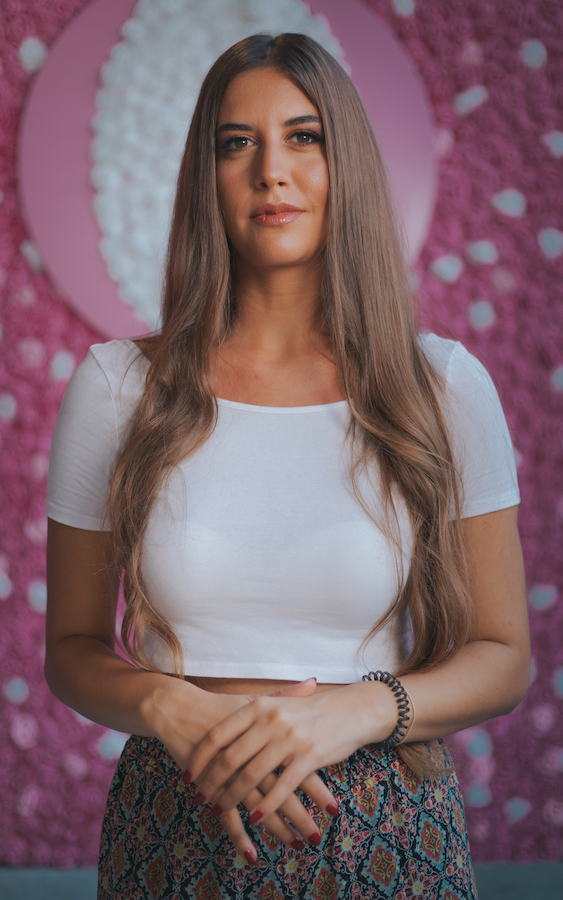Life Style: UK app launches program to help refugees through running

Singer Farrah El-Dibany discusses performance for President Macron’s victory rally
DUBAI: On a recent work trip to Geneva, Egyptian opera singer Farrah El-Dibany received an unexpected phone call. It was April 23, the eve of election day in France, where President Emmanuel Macron was running for reelection against right-wing candidate Marine Le Pen. Macron’s team contacted El-Dibany to invite her to perform “La Marseillaise” – the French national anthem – in Paris after his possible victory speech at the foot of the Eiffel Tower, an event that would be watched by millions. No pressure at all.
“I was skeptical at the beginning. I couldn’t grasp the size of this event,” El-Dibany tells Arab News from the French capital, where she lives. “I was pacing round the room like crazy. It was very tense. I had to organize things quickly — including the dress.” That dress — a red strapless gown by Lebanese designer Gemy Maalouf — attracted almost as much media attention as El-Dibany’s a capella performance.
“I was so stressed I couldn’t sleep,” she continues. “I woke up early, took the train to Paris, and went straight to rehearsals. It was surreal. I don’t know how this all happened.”
She was well aware of the challenges of taking on one of the most famous melodies ever written.
“It was so intimidating,” the mezzo-soprano recalls. “I was non-stop rehearsing it. I was afraid to mess it up or forget a word, because everyone in the world would be watching, not just France. I’m not French, so I cannot permit myself a mistake. A French person can make a mistake — it’s his country and anthem.”
Despite the short notice, and the pressure, the performance was a triumph. El-Dibany performed a two-minute operatic take on the anthem, surrounded by a mass of Macron supporters who began singing with her. Post-performance, Macron kissed El-Dibany’s hand out of respect and appreciation.

“He was very nice and welcoming,” she says. “I’d met him before, so he knew me as a singer. When I came on stage, I saluted him and he (returned the gesture).”
The televised performance was a significant and symbolic cultural moment. El-Dibany became the first foreign artist to perform the national anthem following a presidential victory declaration in France. That was unlikely to have been a coincidence, given Macron’s ideology of advocating social diversity. According to El-Dibany, the last time a non-French artist gave a rendition of the song was American opera legend Jessye Norman in 1989, to mark the 200th anniversary of the French Revolution.
“It is definitely the highlight of my career,” El-Dibany says. “It’s something unique and something that I will never forget.”
Hers is a career with many highlights to choose from, too. She became the first Arab artist-in-residence at the prestigious Opéra National de Paris, founded by King Louis XIV in 1669, landing a three-year contract there. She has received France’s Ordre des Arts et des Lettres (awarded to those who have made a significant contribution to the “enrichment” of French culture). Her talent has taken her to the National Museum of Egyptian Civilization, Beirut Chants Festival, Institut du Monde Arabe, the Palais Garnier, and the Giacometti Foundation, among others. She’s been called the “Egyptian Carmen,” singing compositions by Mozart, Beethoven, Bizet, Tchaikovsky, and Rossini, as well as paying tribute to Arab icons including Dalida, Asmahan, and Fayrouz.
El-Dibany was born in Alexandria in 1989. She attended the city’s well-known conservatory for piano lessons from the age of seven and sang in her school choir.
“I grew up in a very musical and artistic atmosphere, although none of my family members are professional musicians,” she says. “My parents definitely noticed that I had a voice. They kept supporting me.”
El-Dibany’s mother was a banker, her father an architect. At one point, El-Dibany looked set to follow in his footsteps. She travelled to Berlin and studied architecture and opera at two different universities.
“Studying two things at the same time was very challenging,” she says. “It was a marathon and everyone around me — except my parents — was telling me that I would never be able to do it.”
It was her grandfather who first introduced El-Dibany to the greats of opera: Luciano Pavarotti, Plácido Domingo, Maria Callas, and Teresa Berganza.
“What I like about opera is the theatre behind it,” she explained. “It’s a combination of acting and singing. I love (inhabiting) a role. When I sing an aria, I’m in a role, in a moment.
“People still think opera is kind of like screaming,” she continues. “It is very dramatic, but we don’t scream; we have a technique. With this technique, we can (hit) all these different notes or registers. People don’t understand that behind this singing there’s a lot of technical work.”
El Dibany moved to France in 2016, looking to take her career to new heights — something that she says would have been almost impossible back home.
“The thing is, for opera, I cannot make a real career in Egypt. Yes, I have performed at the opera houses in Cairo and Alexandria, but at a certain point when you become really professional in this field, you find yourself needing more opportunities,” she explains. “Opera, at the end of the day, is not part of Eastern or Arabic culture, it’s very Western. There are more opportunities in Europe.”
Perhaps one of the reasons why opera is universally loved is because it stirs people’s emotions, regardless of whether you understand the lyrics. “Opera is not about understanding the text; it’s about the voice,” El-Dibany says.
And protecting that voice is vital. El-Dibany avoids spicy food, drinks anise tea, and trys to avoid conversation on days when she’s performing. “Speaking is our enemy,” she says. “It tires the voice immediately.”
Despite her recent moment of global fame, El-Dibany isn’t resting on her laurels. She is eager to continue her upward momentum.
“The ultimate dream for me is to have the love of the people,” she says. “To have more and more people that would want to hear my voice and listen to me sing all over the world. This is what being an artist is all about.”
Noting that the news was copied from another site and all rights reserved to the original source.




